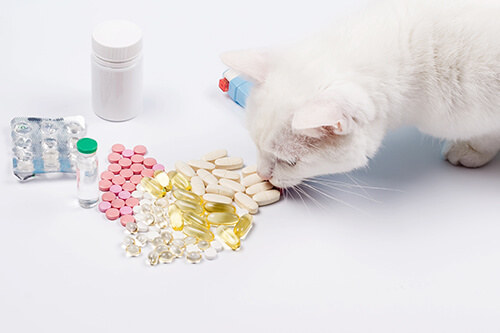Amphetamines are toxic to cats, posing a serious threat to their health and well-being. Amphetamines are known to be toxic to cats, causing severe harm and risking their overall health.
Amphetamines are stimulant drugs that affect the central nervous system and can lead to various adverse effects on feline health. Cats can be exposed to amphetamines through accidental ingestion or contact with substances containing these drugs. The most common source of amphetamine exposure in cats is the ingestion of drugs prescribed for humans, such as adhd medications or appetite suppressants.
Even a small amount of amphetamines can have serious consequences for a cat’s health, including symptoms like increased heart rate, elevated blood pressure, restlessness, dilated pupils, tremors, seizures, and even death. It is crucial for cat owners to keep amphetamines and other potentially toxic substances securely stored and out of their pet’s reach to ensure their safety.

Credit: www.aspcapro.org
Understanding Amphetamines And Their Effects On Cats
Amphetamines are a type of drug that can be toxic to cats. These drugs are commonly used as stimulants and can have various forms such as pills or powders. While amphetamines have effects on the human body, they can impact cats differently due to physiological differences.
Comparing humans and cats, the effects of amphetamines can be more severe for cats. It is important to understand that cats are more sensitive to these drugs and even a small amount can lead to serious health issues. Symptoms of amphetamine toxicity in cats may include agitation, rapid heart rate, increased body temperature, seizures, and even death.
If you suspect your cat has ingested amphetamines, it is crucial to seek immediate veterinary care to prevent any further complications.
Recognizing The Symptoms Of Amphetamine Toxicity In Cats
Amphetamine toxicity in cats can have severe consequences. Cats exposed to amphetamines may display various symptoms. These include immediate effects like increased heart rate and hyperactivity. Behavioral changes like restlessness and aggression may also be noticeable. Physical symptoms such as dilated pupils, vomiting, and seizures may occur.
It is important to recognize these signs and seek immediate veterinary care. Long-term consequences of amphetamines on cats can include organ damage and neurological issues. In summary, amphetamines are toxic to cats, and recognizing the symptoms is crucial for their well-being.
Veterinary intervention should be sought promptly to ensure the best possible outcome.
Seeking Veterinary Help For A Cat Exposed To Amphetamines
Amphetamines can be toxic to cats, so it is essential to seek immediate veterinary care if your cat is exposed. Contact your vet and explain the suspected exposure to ensure proper diagnosis. Diagnostic tests will be conducted to determine the level of amphetamine toxicity in your cat.
If necessary, the vet will start treatment to counteract the effects of the toxin. Rehabilitation and ongoing care may be necessary for cats recovering from amphetamine exposure. Remember, quick action and professional help are crucial in these situations to ensure the well-being and recovery of your feline companion.
By prioritizing your cat’s health, you can provide the best chance for a successful outcome.
Preventing Amphetamine Toxicity In Cats: Tips For Pet Owners
Amphetamines can be toxic to cats, so it is crucial for pet owners to prevent potential harm. Safeguarding amphetamines from pets is essential. Proper disposal techniques for medications containing amphetamines should be followed. Educating pet owners about the dangers of amphetamines is vital.
It is also important to explore alternative solutions for managing conditions that require amphetamines. Creating an amphetamine-free environment for cats can help prevent accidental exposure. By taking these precautions, pet owners can ensure the safety and well-being of their feline companions.
Remember, keeping amphetamines out of reach is key in protecting cats from potential toxicity.
Conclusion
Based on the information presented, it is clear that amphetamines can be highly toxic to cats. These substances can have a wide range of harmful effects on the feline body, including elevated heart rate, increased blood pressure, seizures, and even death.
It is imperative that cat owners are aware of the dangers associated with amphetamine exposure and take necessary precautions to ensure their pet’s safety. This includes proper storage of medications, keeping potentially toxic substances out of the reach of cats, and seeking immediate veterinary care if ingestion or exposure occurs.
As responsible pet owners, it is our duty to prioritize the well-being of our furry companions and make informed decisions regarding their health. By understanding the risks and being proactive, we can help protect our beloved feline friends from the harm that amphetamines can cause.


